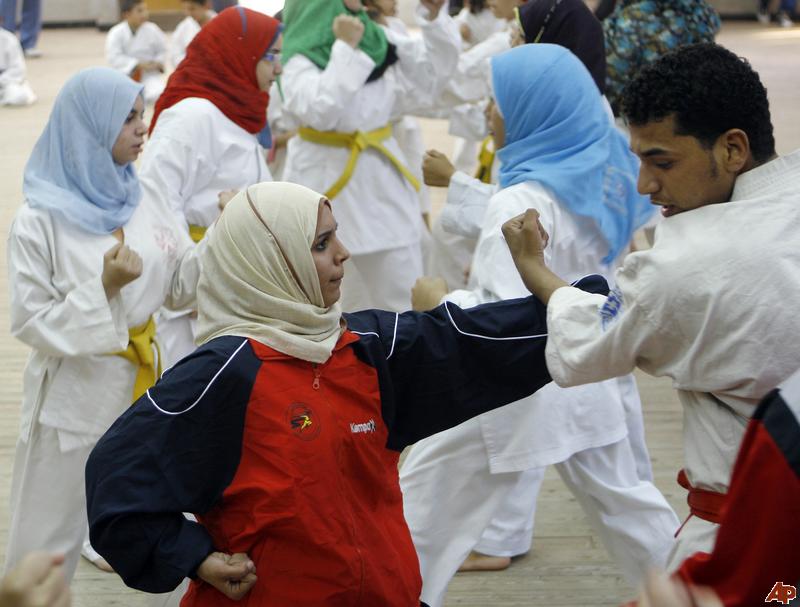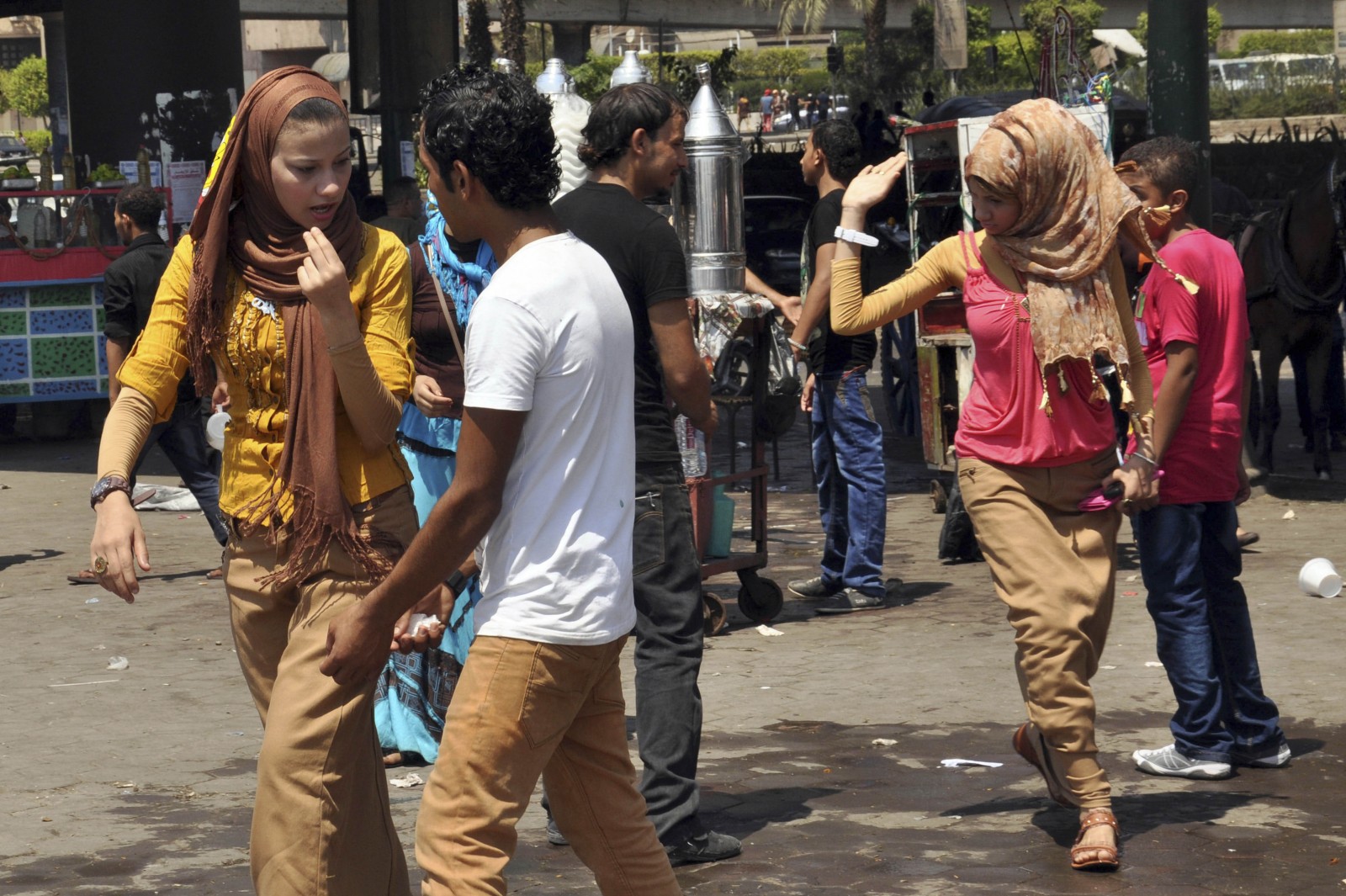
Before Egypt armed forces unleashed violence Wednesday, crushing a defiant sit-in of Islamic Brotherhood supporters, attention shifted toward Egyptian women and their battle for safety in the street.
Shorouk Al Toraby must have been infuriated when she stepped in front of the mini bus whose driver was sexually harassing her on Saturday in the city of Tanta, north of Cairo. She was trying to call for help when the driver stepped on the gas and ran her over, killing her immediately.
The driver was arrested but was later released by prosecutors on bail, and an autopsy is scheduled. The murder of Toraby is the latest to hit a nation deep at its knees in sexual violence.
In September 2012 in the conservative city of Assuit, 20-year-old Iman was shot in the head after standing up to a sexual harasser she knew.
Iman and her cousin were returning from town, both carrying cement bags balanced on their heads, when two men on a motorcycle slowed and came by their side. The driver groped Iman, who in turn spat on him. He hit her and caused her to fall down under the weight of the bags. When she tried to stand up, he shot her in the neck, killing her.
Activist Lobna Darwish, who goes by the Twitter handle @lobna, commented on the two murders via Twitter: "Shorouk and Iman, two girls killed in one year because they were responding to men harassing them in the street. Sexual harassment kills, and if it doesn't, it makes every day unlivable."
An online campaign was started over the weekend to pressure the Egypt's Ministry of Interior to release the information and picture of Toraby's killer after his name was mentioned only in initials, and no image of him released.
It is becoming increasingly obvious that women are in the middle of a social epidemic, which mostly peaks in times of celebrations — like this one, Eid al-Fitr — leaving Egyptian women in the street with little reason to celebrate.
It’s an epidemic where 99.3 percent of Egyptian women experience sexual harassment, according to a recent report by the United Nations Entity for Gender Equality and the Empowerment of Women. The UN report stated, “Through this study it is possible to confirm that the widespread sexual harassment in Egypt is unprecedented as 99.3 percent of women asked answered they have personally faced some type of harassment."
The 99.3 percent is a staggering increase from 2007, as a study published that year by the Egyptian Center for Women Rights reported over two-thirds of Egyptian women had experienced harassment. The increase is abundantly visible in the street; the more women dress conservatively, the more harassment persists and prevails.
The religious celebration that follows the fasting month of Ramadan has become infamous for the eruption of mob sexual assaults, most intensely in downtown Cairo where a cluster of movie theaters and shops are crammed within a few miles radius. Thousands of youngsters descend on downtown Cairo during the three day holiday — girls and boys flaunting new clothes, and with fun on their minds. But Egyptian boys' notion of Eid fun includes touching and groping women and girls.
In 2005, for the first time, a mob assault was recorded on a cellphone camera and shared online. The clip showed persistent attempts by a group of men to sexually assault a number of girls outside a downtown movie theater, and showed a couple of girls taking refuge at a neighboring shop that saw its windows and doors attacked as the men tried to break in.
The footage offered clear proof to Egyptians that harassment needed to be addressed more seriously. But until recently, the word sexual harassment, taharosh in Arabic, was not used. Instead, the word used was “mo’aksa,” or flirting. It was getting hard for the flirting concept to remain firm when evidence proved women were being groped and raped in public. Some of the girls in the clip were stripped in the street and laid on the floor as men threw themselves in hoards over her body.
Help was slow in coming, and some eye witnesses confirmed media reports that police were nearby and watched the whole incident unravel before their eyes.
“They just stood there,” witnesses said. Yet the local media’s attention shifted elsewhere. The attack got little reporting, and in such language that was unfair to the survivors.
Action from the Street
In response, street solutions have started to develop. “I saw Harassment,” or Shoft Ta7arosh, in Arabic, alongside a number of other anti-sexual harassment campaigns and volunteer groups like Operation Anti-Sexual Harassment and Tahrir Bodyguards, are emerging at a time when security forces don’t feel the need to pay attention and prevent such attacks.
The initiatives run a hotline to help survivors legally and with psychological support, and at times to get medical attention or assistance escaping a mob attack. The groups also advocate in the street, handing out flyers and engaging passersby in conversations in an attempt to end societal compliance in the attacks.
Alarmingly, I Saw Harassment recently named young boys and teens as the “leading men” in sexual harassment during the holiday, nicknaming downtown “a terrifying epicenter of harassment.” The group said some of the perpetrators were as young as 8 and 10 years old.
“Most of the young men committing these crimes of sexual harassment don’t even know that what they are doing is sexual harassment,” said a statement shared on their Facebook page.
“Some of them said they are rejoicing the Eid by ‘fooling around’ with women’s bodies.”
And in iconic Tahrir Square, from June 28 to July 3, women groups recorded 101 incidents of sexual assault in and around the vicinity of the square. In November 2012, gang rapes were committed “amidst disregard from official and unofficial bodies,” said a joint statement from women organizations in Egypt, released July 3.
And on the Egyptian revolution’s third anniversary, on January 25, some 19 cases of sexual assaults and gang rape were again reported in and around Tahrir Square. The attacks targeted female protesters, passersby, journalists and volunteers in field groups, some of whom were intervening to stop an incident and fell under the hands of perpetrators. Women reported what happened, even with lack of public support.
Blame Culture
I Saw Harassment, in a press release, has called on authorities and society to avoid survivor blame. Egyptian women and girls who suffer such atrocities become hesitant in reporting to police, who mostly question the woman’s attire and behavior at the time of the attack, rather than working on identifying the perpetrator and bringing him to justice. Shifting blame, and bystanders’ indifference and acceptance to such crimes happening in daylight in crowded areas, raises still more challenges to the autonomy sought by Egyptian women.
Because Egypt is a society steeped in the tradition of blaming women for such crimes, many decide against reporting the violations to authorities. But times appear to be changing, as more women have begun to step forward with their stories and experiences. The Internet has allowed women to get much needed support by reading other women’s stories or telling their own.
Groups like HarassMap were founded so that society could end its acceptance of harassment. Through educational campaigns, the group aims to reach families and individuals by inviting them to experience the struggle together, and involve grown men and young men in the conversation.
For example, when Egyptian men are asked, “Why is sexual harassment rampant?” some openly admit to doing so, saying that the way women dress and behave in public “drives” them to commit such crimes.
Egypt's sexual violence laws use the term sexual assault, hence undermining verbal and sexual harassment and casting vagueness over the definition of sexual harassment. Many police officers will talk woman out of filing a report, and if the woman insists, in many cases perpetrators are given weak sentences and freed to resume their normal lives.
But through its growing grassroots campaigns and groups, Egypt may see changes that include men and boys who finally, and peacefully, learn to share public spaces with women without the notion of using them as celebratory objects — or eliminating them when they oppose sexual harassment.
3 WAYS TO SHOW YOUR SUPPORT
- Log in to post comments
















